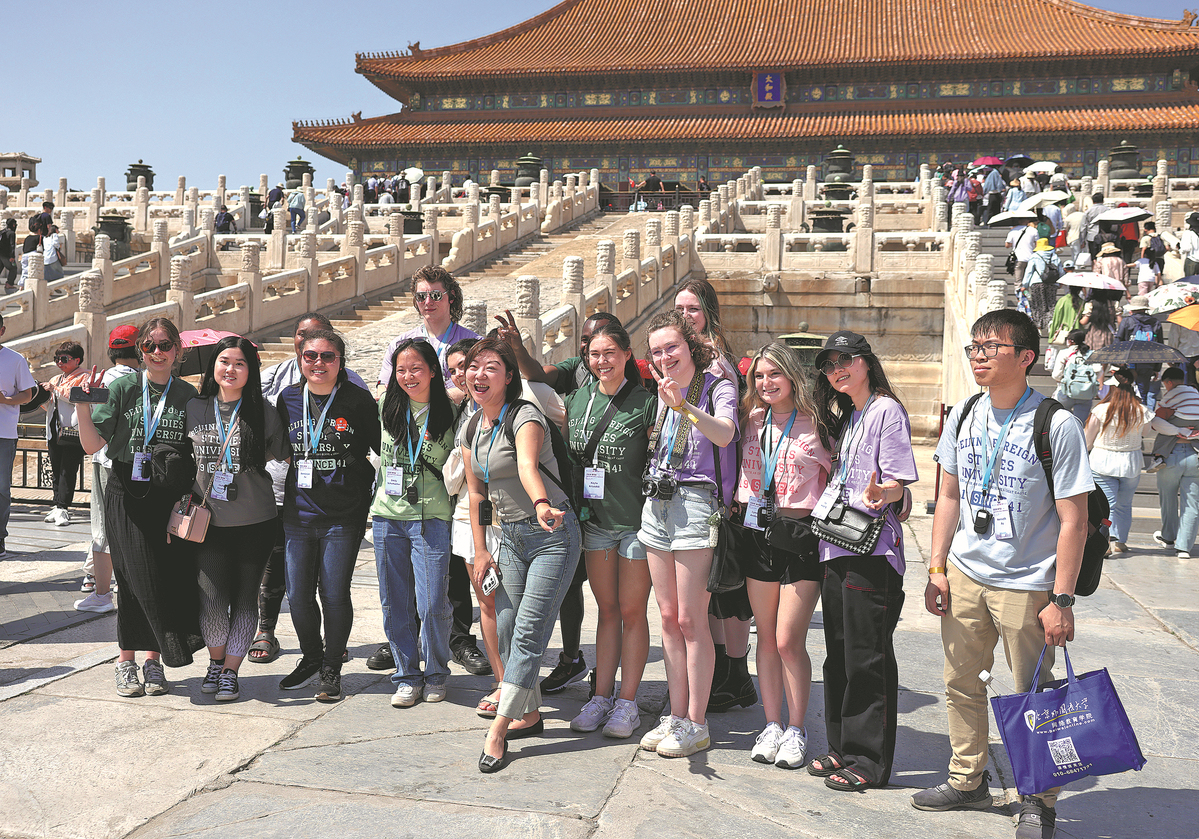Youths hold the key to a better Sino-US future

Students from the Indiana University of Pennsylvania in the United States visit the Forbidden City in Beijing on May 17.ZOU HONG/CHINA DAILY
This year marks the 45th anniversary of the establishment of diplomatic relations between China and the United States. Celebrating this occasion, Chinese and US leaders sent messages to the 14th China-US Tourism Leadership Summit held in Xi'an, Shaanxi province. Leadership summits such as these, especially when bilateral ties are strained or facing severe challenges, provide much needed opportunities for people-to-people exchanges, which are vital to reducing misunderstanding.
Misunderstanding, misperception and even fear are often based upon unknowns. With our world becoming more complex and complicated by the day, we need to eliminate those unknowns with global understanding and friendship now more than ever before. Helping to address this challenge, the recent steps taken by China could help clear the unknowns.
It is estimated that only 2 percent of the world's population has traveled beyond their countries' borders. At the same time, an increasing number of people throughout the world are realizing that we are stronger together. By collectively leveraging our knowledge and resources through better collaboration, we can all play an important role in solving global problems ranging from climate change and poverty to health issues.
Addressing these global challenges, President Xi Jinping's emphasis on "people-to-people diplomacy" with the aim of promoting friendship between people and strengthening relationships among countries is timely. Further promoting the value of this diplomacy, the Chinese leader's recent announcement of a new visa-free travel policy for citizens of a dozen or so countries has been met with enthusiasm. In addition, his invitation to 50,000 youths from the US to visit China in the next five years is a welcome move which will further facilitate and promote international understanding and friendship.
For people visiting China as tourists or on business, the new visa-free policy is a "win-win". When visiting China, tourists can explore an incredible country characterized by opportunities and beauty, which ranges from the warmth of the Chinese people to natural scenic sites. In Guangzhou, for example, tourists can experience the "City of Flowers", soak in Cantonese culture, and marvel at the city's architecture, paintings and porcelain, and enjoy its operas, music and food.
Most foreigners visiting China on business mention the Canton Fair, which is famous for providing one of the world's best displays of merchandise. Business travelers also realize China offers unprecedented foreign investment opportunities and a welcoming business environment. The Guangdong-Hong Kong-Macao Greater Bay Area is regarded as one of the most educated, talented and capital rich regions in the world. No wonder Guangzhou is the top destination for foreign investors including Fortune Global 500 companies in China.
The fact that today's students are tomorrow's world leaders makes student exchange programs all the more important. Having personally witnessed the positive impact of student exchange programs in Guangzhou, I have seen young minds develop different perspectives through greater global understanding and appreciation. These first-hand experiences unfortunately cannot be learned from a book or in a classroom.
I call student and other types of exchange programs "force multipliers". Domestic and foreign participants meet each other face-to-face, learn from one another and form lasting bonds based on mutual respect and empathy. These positive experiences and bonds are then exponentially multiplied as they are shared with family, friends and communities.
Do we have differences? Of course. To think otherwise would be naive. A vast majority of these differences are further compounded by miscommunication. People from different cultures and speaking different languages think and approach challenges differently. And "people-to-people diplomacy" and their interpersonal relations help overcome the challenges of miscommunication.
Differences can be navigated and settled. The best way to resolve differences is often through mutual understanding. Rather than focusing on the differences, let us learn from one another and peacefully settle our differences.
No matter which country we belong to, we all share and love the same planet. Working together, we can build a better tomorrow for our children and that is what matters the most.
